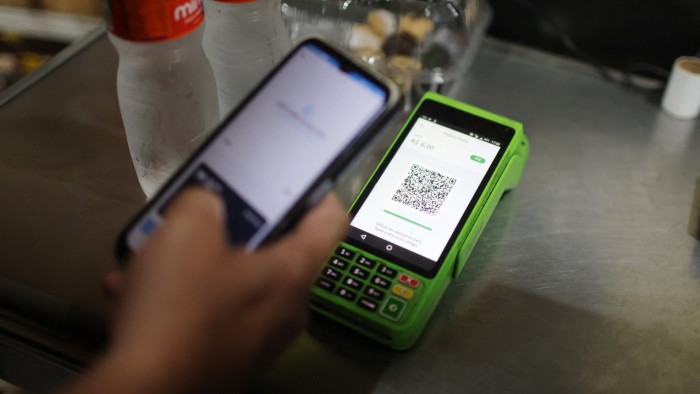It is one of the world’s big fintech success stories, a daily staple for beggars and billionaires alike, but Brazil’s instant payment system Pix has now fallen foul of US President Donald Trump.
Launching an investigation into Brazil’s “unfair trade practices” on July 15, Washington said it would probe whether the South American giant was discriminating against US companies in favour of its government-developed electronic payment system.
The previous week Trump had vowed to impose 50 per cent tariffs on Brazil and called on the authorities to end the trial of his ally, far-right former president Jair Bolsonaro, on charges of plotting a coup.
Brazil’s government responded with outrage, saying it would not accept political interference in its justice system. It pointed out that it runs a trade deficit with the US, rather than the surplus enjoyed by other countries in Trump’s sights.
But Brasília reserved particular ire for the attacks on Pix, which is universally loved by Brazilians for offering instant, free, easy payments.
“Pix is Brazil’s. We will not accept attacks on Pix, which is the patrimony of our people,” vowed Luiz Inácio Lula da Silva, Brazil’s leftwing president.
The government launched a campaign on social media with the slogan “PIXéNosso, My Friend” (Pix is Ours, My Friend), suggesting that the US was suffering a “bad attack of jealousy” over Brazil’s “safe, secure and fee-free system”.
Launched by the central bank in November 2020 as an alternative to slower interbank transfers which charged consumers a fee, Pix caught on quickly. It now accounts for nearly half of Brazil’s financial transactions by volume and is used by about 160mn people, or 76 per cent of the population, according to the central bank.
Recommended
The IMF praised it as “highly successful” in a 2023 paper and the G20’s financial inclusion initiative has recognised it as an example of good practice.
From the beaches of Rio de Janeiro to distant corners of the Amazon jungle, Pix is an essential feature of everyday life. The payment tool, mostly used on mobile phones, has brought more than 70mn Brazilians into the financial system for the first time, making payments simple for top executives and slum-dwellers alike.
Merchants love it for its low charges — typically about 0.22 per cent of a transaction, compared with more than 1 per cent for a debit card and more than 2 per cent for some credit cards. Consumers pay no fees and like the convenience of paying with a QR code or by typing in the recipient’s tax ID number, mobile phone number or email address.
Alessandra Korap, 41, a member of the Munduruku tribe in the Amazonian state of Pará, said Pix has had a positive impact for marginalised people such as the indigenous. “It’s a very important tool for people who have difficulties to leave home.”
Asked about Washington’s investigation into Pix, she said: “The US should solve its own problems. Each country has its own autonomy and sovereignty. They should only rule in their own home”.
In the Munduruku settlement of Sawré Muybu, villagers use Pix — via a Starlink internet connection provided by an NGO for a forest monitoring project — to settle bills, trade with neighbours or sell artisanal wares to visitors.
For Valdenildo Saw, 35, Pix reduces the need to travel to the nearest town of Itaituba, which takes an hour and a half by motorboat, then car.
“It makes life easier. Before you had to go to the town to pay bills in person. If you want something like coffee, sugar or soap, you send a Pix,” he said, explaining that he can pay a driver to bring items to a small riverside landing a shorter distance away.
Valdenildo Saw says that without Pix he would have to travel an hour and a half from his village to the nearest town to shop and pay bills © Michael Pooler/FT
Pix’s success has not pleased everyone. A study by Brazilian payments firm Ebanx last September predicted that it would surpass credit cards by the end of this year as the main payment system for ecommerce. Roberto Campos, at the time head of the central bank, said in 2022 that as Pix developed new features it “eliminates the need to have a credit card” and predicted that credit cards “will cease to exist at some point soon”.
Mastercard’s Brazil division president Marcelo Tangioni called in the same year for Pix to be made independent of the central bank, which he said “cannot compete and regulate at the same time”. Major banks in Brazil are obliged to participate in Pix.
Meta also has reason to raise questions about Pix, though it has not done so in public. The US tech group’s WhatsApp platform launched a digital payments system in Brazil in June 2020, but a week later the central bank in effect blocked the service on competition and data privacy grounds. It was permitted to relaunch only the following year, six months after Pix’s rollout.
At the time of the ban, WhatsApp said it believed the Brazilian central bank was concerned the messaging app’s payments system might compete with Pix.
Some of Lula’s leftwing lawmakers have little doubt that the US probe into Brazil is motivated by lobbying from US companies that have lost out from Pix’s success.
Elvino Bohn Gass, a Workers party (PT) deputy, said in a post: “As if the blackmail of tariffs were not enough, Trump is now threatening Brazil because of Pix. But what he is calling ‘unfair practice’ is just the fear of competition of American companies like Visa, Mastercard and Amex, now that Pix can substitute cards.”

